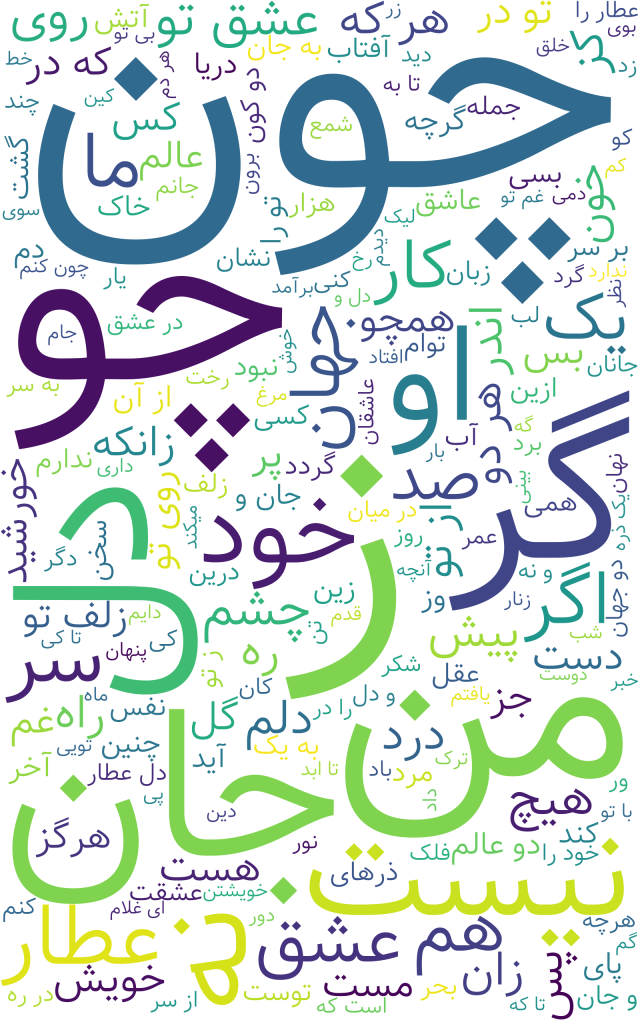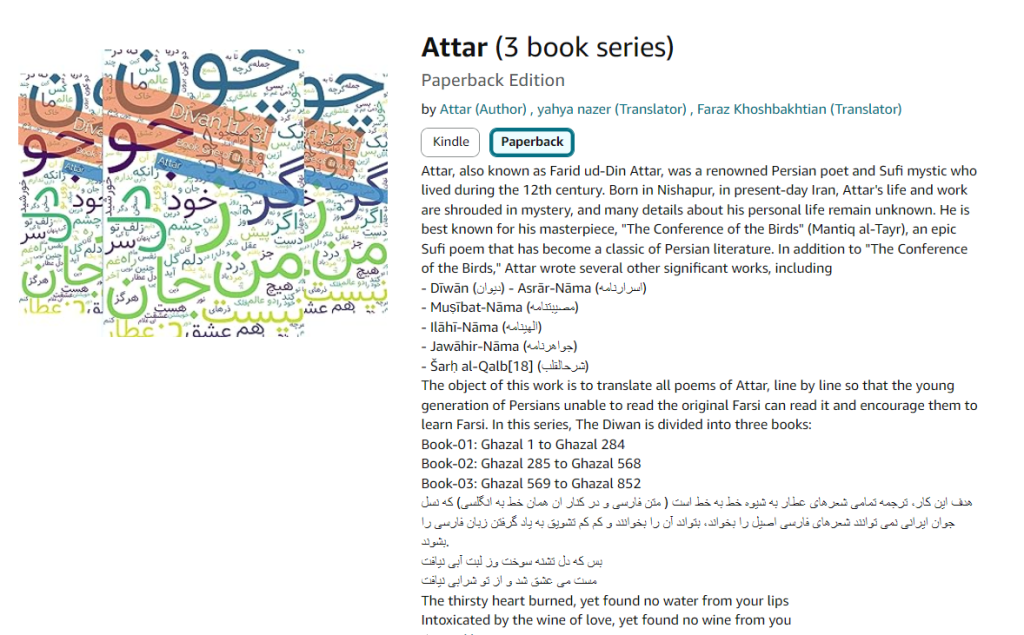Attar
Attar, also known as Farid ud-Din Attar, was a renowned Persian poet and Sufi mystic who lived during the 12th century. Born in Nishapur, in present-day Iran, Attar’s life and work are shrouded in mystery, and many details about his personal life remain unknown.
He is best known for his masterpiece, “The Conference of the Birds” (Mantiq al-Tayr), an epic Sufi poem that has become a classic of Persian literature. In this allegorical work, Attar tells the story of a group of birds who embark on a journey to find their king, the mythical Simurgh. Throughout their quest, the birds face numerous challenges and symbolic trials, each representing a spiritual lesson. As the journey progresses, many birds fall away, unable to endure the hardships, until only a handful reach their destination. The poem serves as a metaphor for the soul’s search for divine truth and self-discovery.
Attar’s poetry is characterized by its profound spiritual insights, symbolism, and mystical themes. His verses explore the concepts of love, devotion, detachment from materialism, and the unity of all existence. He often used simple language and vivid imagery to convey complex spiritual ideas, making his poetry accessible to a wide audience.
In addition to “The Conference of the Birds,” Attar wrote several other significant works, including
• Dīwān (دیوان)
• Asrār-Nāma (اسرارنامه)
• Muṣībat-Nāma (مصیبتنامه)
• Ilāhī-Nāma (الهینامه)
• Jawāhir-Nāma (جواهرنامه)
• Šarḥ al-Qalb[18] (شرحالقلب)
Attar’s legacy continues to be celebrated today, and his contributions to Persian literature and Sufi thought have earned him a place among the most esteemed and revered poets in the history of Persian literature. His works continue to inspire readers around the world, offering timeless wisdom and guidance on the path of spiritual enlightenment.
The object of this work is to translate all poems of Attar, line by line so that the young generation of Persians unable to read the original Farsi can read it and encourage them to learn Farsi.
عطار، همچنین با نام فرید الدین عطار شناخته میشود، شاعر برجسته و عارف سوفی ایرانی بود که در قرن دوازدهم زندگی میکرد. او در نیشابور، ایران امروزی، به دنیا آمد و زندگی و آثارش پر از اسرار و اطلاعات ناشناخته ماندهاند
او به خاطر اپیک عارفانهاش به نام “منطق الطیر” به شهرت رسیده است که به عنوان یکی از اثرهای کلاسیک ادبیات پارسی شناخته میشود. در این اپیک، عطار داستان گروهی از پرندگان را روایت میکند که به سفری برای یافتن پادشاه خود، یعنی سیمرغ افسانهای، میروند. در طول این سفر، پرندگان با چالشها و آزمونهای نمادین روبرو میشوند که هر کدام یک درس روحانی را نمایان میکنند. تا پایان سفر، بسیاری از پرندگان تحمل مشقتها را ندارند و تا مراحل پایانی نمیرسند. این اپیک به عنوان مجازیترین اثر در مورد روحانیت، دانش روحانی، و حقیقت خداوند شناخته میشود.
شعر عطار به خاطر نگاههای روحانی عمیق، نمادینبودن و موضوعات عارفانهاش شناخته میشود. اشعار او به مفاهیم عشق، اخلاص، جدایی از مادیت، و اتحاد هستی پرداختهاند. او اغلب از زبان ساده و تصاویر زنده برای انتقال افکار روحانی پیچیده استفاده میکند که شعرهای او را برای گسترهی مخاطبان دسترسپذیر میسازد.
علاوه بر “منطق الطیر”، عطار چندین اثر دیگر مهم نیز نوشته است، از جمله “دیوان”، “اسرارنامه”، “مصیبتنامه”، “الهینامه”، “جواهرنامه”، و “شرحالقلب”. آثار او هنوز هم تأثیرگذاری در ادبیات پارسی و فلسفه سوفی دارند و نسلها از شاعران و طلبههای روحانی تحت تأثیر قرار میگیرند.
میراث عطار امروز همچنان جشن گرفته میشود و کسب او در ادبیات پارسی و اندیشههای صوفی، او را در میان بزرگترین و ارجمندترین شاعران تاریخ ادبیات پارسی قرار داده است. آثار او همچنان خوانندگان را در سراسر جهان الهام بخشیده و حکمتها و هدایتهای ابدی را در مسیر روشنایی روحی ارائه میدهد.
هدف این کار، ترجمه تمامی شعرهای عطار به شیوه خط به خط است ( متن فارسی و در کنار ان همان خط به انگلسی)
که نسل جوان ایرانی نمی توانند شعرهای فارسی اصیل را بخواند، بتواند آن را بخوانند و کم کم تشویق به یاد گرفتن زبان فارسی را بشوند.
بس که دل تشنه سوخت وز لبت آبی نیافت
مست می عشق شد و از تو شرابی نیافت
The thirsty heart burned, yet found no water from your lips,
Intoxicated by the wine of love yet found no wine from you.
You can buy either Kindel eBook or Paperback from Amazon.

